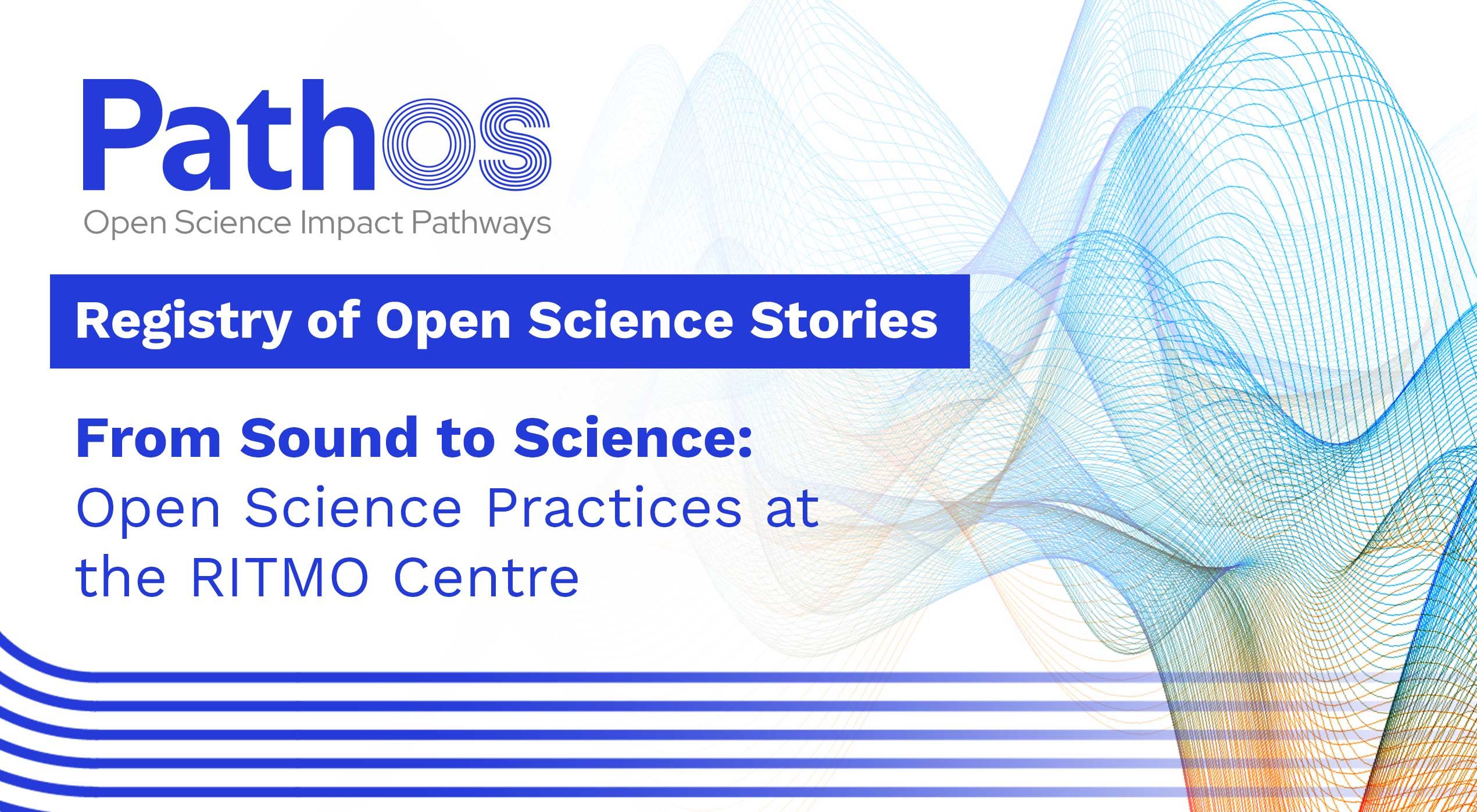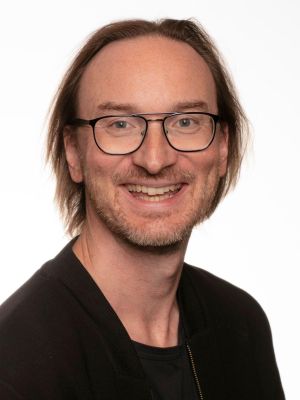From Sound to Science: Open Science Practices at the RITMO Centre

Within PathOS we are collecting stories on how Open Science (Open Access to publications, Open/FAIR data and software, collaborations with citizens) has made a positive or negative impact. Our ultimate aim is to highlight stories of Open Science practices and how these are linked to impactful outcomes. In this way, we hope to foster a learning experience and to inspire others to follow. Join us and read the first Open Science stories!
Could you briefly introduce yourself and what your Open Science story is about, including its time (e.g. year range) and location?
I'm Alexander Refsum Jensenius, a professor of music technology at the University of Oslo, and right now I'm directing an interdisciplinary centre called RITMO Centre for Interdisciplinary Studies in Rhythm, Time, and Motion, which is a collaboration between departments of musicology, psychology and informatics. It is a highly interdisciplinary centre where we have people from arts and humanities, social science, psychology, neuroscience, computer science, and robotics. The interdisciplinary aspect is crucial to understand the variety of projects we're doing; some of these are more humanities oriented, while others are more focused on neuroscience or technology. In general, though, we try to work on projects that are in between. By doing that, we benefit from the diverse perspectives and knowledge that different disciplines offer, but we also face challenges, such as data complexity.
"The general trend is that you see more openness everywhere, but there are still many challenges when moving from policy making to real-life research."
What was your role or relationship to this Open Science practice? Were you a direct participant, an observer, or something else?
I personally prefer to call it Open Research rather than Open Science because I'm working in between art and science, and because I notice that many people on the arts and humanities side feel alienated when we call it Open Science.
I've been doing Open Science and Open Research throughout my entire career and I'm trying to work as openly as possible everywhere. The music technology community worldwide is a very open community and has been like this since I started doing research in the early 2000s. There has been a culture of sharing code, audio files and video from the beginning. Then, I've been trying to push this culture also into the other fields that I'm working on, where this practice is not as common. I'm trying to do all my work openly, for instance last year I personally collected data for a project on human standstill, including my own breathing, respiration, and motion patterns. I published this data online daily and maintained a public diary to share my experiences. Now, I’m writing a book that covers all these aspects. Then, of course, I am also trying to promote this approach for my PhD students and postdocs, my own research group, and also within my centre.
Were there any quantifiable outcomes or measurable successes linked to this practice? What metrics or indicators were used to evaluate these outcomes, if any?
Artists, musicians and game developers can and want to use our material, the issue, though, is that sometimes, if we want to openly share the multitrack files of some musician, we might face resistance of the musician or the label based on privacy and/or copyright issues. As a result, we may have to distort the sound and end up sharing a low-quality output that cannot really be used for anything meaningful afterwards.
Anyhow, we do not have metrics to measure this outcome. Sometimes, though, it’s possible to track downloads through system logs, such as on GitHub or Open Science Framework (OSF), but it's not very easy to do it. Funders often want to quantify usage of our material so I talk to my team about the importance of having a tracking system. However, I also think it's important for the researchers to enjoy their work, focus on their research and do not spend too much time on reporting and tracking.
What impacts, both expected and unexpected, did this practice have? Were there any surprising developments or results?
Regarding unexpected impacts, I’ve encountered a few interesting examples. For instance, for a project I'm working on, I've been collecting a lot of ventilation noise recordings, and they are interesting for ventilation experts, who analyse different types of systems and how they sound, but also for creative people in the game industry, who want to create ventilation sound for games. In addition, I developed a video analysis system mainly used for dancers to study their movement on stage, and which turned out to be used in medical application to study the movement patterns of preterm infants, to predict whether they risk developing cerebral palsy.
What challenges were associated with this practice, from your perspective? What lessons can be drawn from its implementation?
We have faced several issues related to openness, particularly regarding privacy and copyrights.
Privacy is more problematic in psychology and neuroscience, where all the studies are on people and with people. At RITMO, we mainly work with adults and healthy people, but we have some projects with minors and patients, and those are tricky from both legal and ethical perspectives. Also, in traditional humanities-oriented research, where there's a lot of interviews, handling the privacy issues becomes very complex, because for those interviews, you can try to anonymize them as much as possible, but it's very difficult to make them completely anonymous. In addition, if you're dealing with psychological data, even if they typically contain data of groups, we're often doing a lot of personal scoring, and those are tricky to publish openly. I've been trying to figure out how we can collect and aggregate data in such ways that it's possible to share it, but it's difficult to do that while keeping the data useful. When it comes to sharing these things, many people just give up because it is so difficult, but my intention is to try to share at least what we can.
Copyright as well represents a big issue when dealing with music because a lot of the music we're dealing with is copyrighted in one way or another. There is also a combination of different types of copyright holders; sometimes people hold the copyright themselves, but in most cases professional musicians are under a label or affiliated with a rights organization handling the copyright. Also, they may have changed the label or organization during the career, which makes it more complicated. Then, of course, it's also varying from country to country. I wish we had been able to get an exemption from copyrights when it comes to research, because without that copyright impacts the research questions that we pose and that we can answer. A solution could be some kind of collective agreement like they have, for example, at the Norwegian National Broadcasting Company. That's something that could have been implemented at a national or even European level. I am not saying that musicians and composers shouldn’t get paid, so there would need to be some money in there to support freelance work. At the same time, I think we need to work towards new business models that promote sharing material, and, ultimately show this can benefit also the creative industry.
How do you perceive this practice's influence on the wider scientific community or society? Has it affected your own views or approaches to research?
If you go just a few years back, people were very sceptical about Open Research. Now, people are still a bit sceptical, but they do it because it is required by funders and institutions. Things are definitely improving, but this is a long-term change, it takes time, and it's good that people at least try to do it. The general trend is that you see more openness everywhere, but there are still many challenges when moving from policy making to real-life research. In addition, in many cases people don't really know exactly what tools or systems to use, how to format their files, and so on. To address this, I wrote a paper titled “Best versus Good Enough Practices for Open Music Research,” which explores the specific challenges empirical music researchers face when adopting Open Research practices. I believe we need to start with low-hanging fruits and then gradually move towards best practices.
Based on your experience or observation, would you recommend this Open Science practice to others? Why or why not?
I would certainly encourage everyone to do it. It's amazing that the politicians are brave enough to actually jump into this despite they met a lot of resistance from researchers, but I still think it's the right thing to do. The big challenge now is to get the infrastructure in place; ZENODO is a good example of infrastructure that helps the researchers, but it doesn't have the same kind of tools that you have in OSF. So, we are lacking a good European based system. Additionally, of course, the research assessment process remains complicated, and we’ve been advocating for improvements in various ways.
